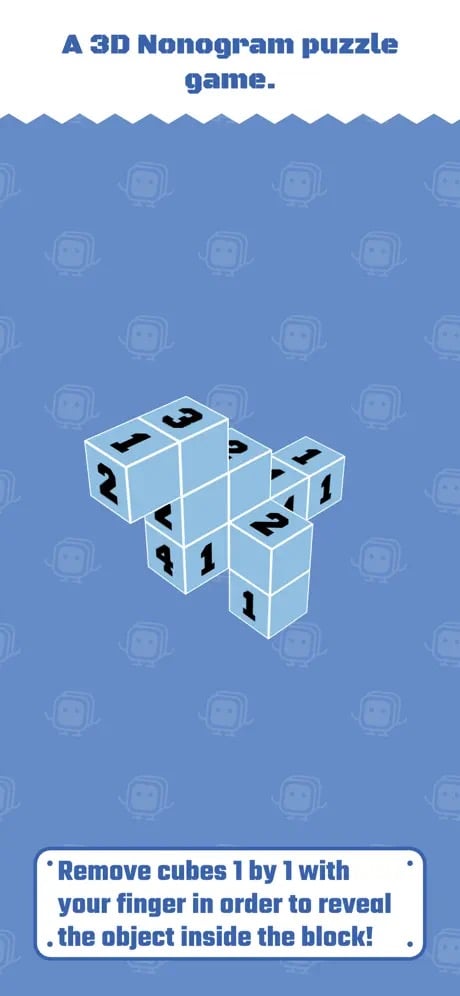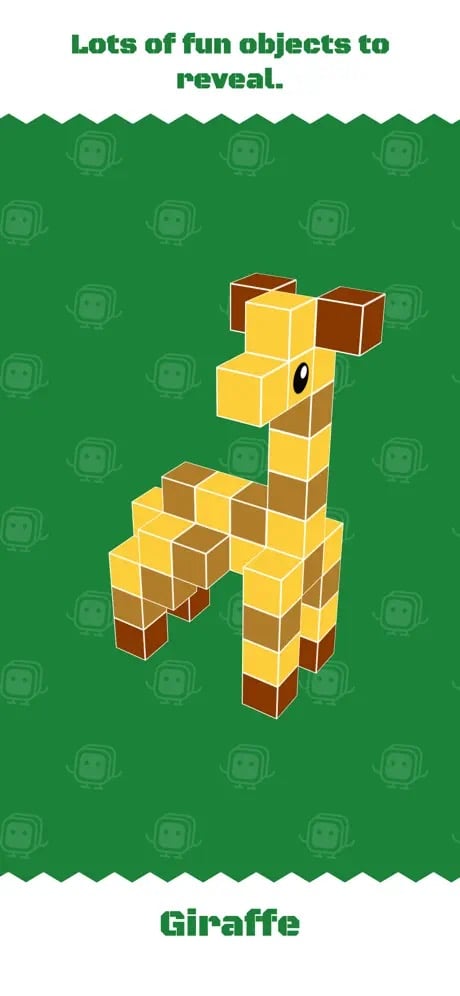 Thinking back to when I first got my iPhone, one of the earlier games I bought was a decent little take-off of Nintendo’s 3D Picross called Oh! Cube. It was implemented fairly well, and I had a nice time going through all of its puzzles. I expected more games along those lines, but just as on consoles, they never really came. Well, here’s one: PiKuBo (Free). It’s pretty clear what it’s doing if you’ve played 3D Picross before, but the devil as always is in the details. Is it worth trying out? Investigation time!
Thinking back to when I first got my iPhone, one of the earlier games I bought was a decent little take-off of Nintendo’s 3D Picross called Oh! Cube. It was implemented fairly well, and I had a nice time going through all of its puzzles. I expected more games along those lines, but just as on consoles, they never really came. Well, here’s one: PiKuBo (Free). It’s pretty clear what it’s doing if you’ve played 3D Picross before, but the devil as always is in the details. Is it worth trying out? Investigation time!
 Let’s talk the money stuff first, because that’s how the world works. As you can see, it’s free to download this game. It won’t hassle you with ads or anything. You get the first puzzle pack without paying a cent, which is a nice way to see if you’re into what it’s laying down or not. You get just over thirty puzzles to solve, with some nice tutorials that explain things to new players and will feel excruciatingly long if you already know what you’re doing. At the time of this review, there are two more puzzle packs available as IAP. Each one offers thirty-six additional puzzles to solve. I imagine if the demand is there, the developer will make more packs available. All up, you’re paying a couple of bucks for around a hundred puzzles. Not bad.
Let’s talk the money stuff first, because that’s how the world works. As you can see, it’s free to download this game. It won’t hassle you with ads or anything. You get the first puzzle pack without paying a cent, which is a nice way to see if you’re into what it’s laying down or not. You get just over thirty puzzles to solve, with some nice tutorials that explain things to new players and will feel excruciatingly long if you already know what you’re doing. At the time of this review, there are two more puzzle packs available as IAP. Each one offers thirty-six additional puzzles to solve. I imagine if the demand is there, the developer will make more packs available. All up, you’re paying a couple of bucks for around a hundred puzzles. Not bad.
I do have one bone to pick with those puzzle packs, though. The puzzles contained in each follow the same general difficulty curve as the included pack, which means that several are wasted on extremely simple puzzles that you’ll solve in a matter of seconds. Presumably anyone buying these packs has already played the initial set, and I don’t see why we’d want to be going back to the basics again. So many of the puzzles are quick and simple that the whole thing ends up feeling a lot smaller than you’d ideally like. Perhaps future packs can be themed so that those who want easier or harder puzzles can get what they specifically want? Just spit-balling.
The puzzles run the gamut in terms of difficulty, and I’m generally satisfied with the challenge of the harder puzzles. Moving beyond that, the most important thing about a game like this is in how it controls. Like its 2D counterpart, 3D Picross plays best with a stylus, some buttons, and a resistive touch panel. There are always a few challenges when it comes to adapting this kind of game, even to an iPhone. One is in how to handle the swap between marking and breaking cubes. Another is in how to fit larger puzzles on the screen while leaving the cubes big enough to work with. PiKuBo approaches this tricky task with some interesting ideas.
 By default, touching the screen will simply allow you to move the puzzle around. You can pinch and… de-pinch? Un-pinch? Do the opposite of pinching. That will allow you to zoom in and zoom out on the puzzle. There are some arrows on the side of the screen that allow you to move layer by layer through the puzzle, and that’s a pretty standard way to handle that. Now, if you want to paint or break the blocks, there are buttons for that. You might think you touch the one you want to use and just go to town. Well, kind of. When you tap the button for each action, it will stay active until you tap a cube. After that, there’s a short window where if you keep tapping, you’ll keep performing that action. Once it elapses, the action is de-selected. This mitigates accidents, and I think it’s a good idea even if it is a little annoying at times.
By default, touching the screen will simply allow you to move the puzzle around. You can pinch and… de-pinch? Un-pinch? Do the opposite of pinching. That will allow you to zoom in and zoom out on the puzzle. There are some arrows on the side of the screen that allow you to move layer by layer through the puzzle, and that’s a pretty standard way to handle that. Now, if you want to paint or break the blocks, there are buttons for that. You might think you touch the one you want to use and just go to town. Well, kind of. When you tap the button for each action, it will stay active until you tap a cube. After that, there’s a short window where if you keep tapping, you’ll keep performing that action. Once it elapses, the action is de-selected. This mitigates accidents, and I think it’s a good idea even if it is a little annoying at times.
In general, I think it controls as well as it can. The screen real estate is certainly tight on bigger puzzles, and accidents will certainly happen from time to time, but those are issues with the original 3D Picross games as well. If you make a mistake, you’ll lose a heart. Run out of hearts, and you’ll have to start the puzzle over again. You can also lose by running out of time. When you complete the puzzle, you’ll be given a rating from one to three stars based on how you did. When you finish a set of puzzles it will be marked with a crown so that you know what you’ve already finished.
In terms of options, you get a selection of four different paint colors to use for the cubes. You can turn the music and sound effects off independently, turn off the cooldown on the paint/break buttons, use a left-handed mode, and reset your progress in case that’s a thing you want to do. There’s a quick save option here as well, in case you need to stop playing in the middle of a big puzzle to go make some pasta or something. And that’s about it. The graphics get the job done, and the music is nice, chill stuff for solving puzzles to.
PiKuBo is a great way to get your 3D Picross fix on mobile, with a good selection of free puzzles and additional puzzle packs available at highly reasonable prices. It’s all wrapped in a highly functional interface and topped off with some nice tunes. Since the first pack is free, you don’t even need to take my word for it. Give it a download and try it. My only real gripe is that the extra puzzle packs have some extremely elementary puzzles included that really shouldn’t be taking up space when we only have around a hundred to play with. Otherwise, this is a very nice puzzler for Picross lovers.